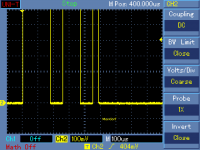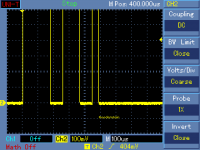Yes, cap1.
Okay, so Mundorf has 0.00031% and ROE has 0.00037%. That's a "big" difference imo (I believe that measurement audibility is underrated). So Mundorf should sound better and my preference.
To me it is not a big difference, regarding harmonic distortion. And the method (on cap) is not like real world application.
There is just one notable difference between these two capacitors, and this is DA (dielectric absorption). This is seen with a DC-like measurement. You will discharge both to zero, then open the leads, and wait some time (like 1 second, 10 seconds, 1 minute etc.). The capacitors will charge to some voltage (very low) due to electric charge absorbed in the capacitor dielectric foil. In this respect, Mundorf is better, it will keep less residual charge than Roederstein. This is due to dielectric used, polypropylene is better here than polyester. SY can tell us more, he is an expert in this field. These are low frequency phenomena, they could occur only with asymmetric waveform of several hundred ms duration. I have no valid data here. I have some basic DC measurements.
Last edited:
Ah, do you mean repeating the test until the result is perfect?
No, thank you. Not in public. You and me may do it.
To me it is not a big difference, regarding harmonic distortion. And the method (on cap) is not like real world application.
From my perception of the files sound, I can relate what I heard (I did 7/7) with (1) Amplitude (2) Distortion (3) General musicality (I believe phase). I use point(3) for my preference assessment.
But may be there is something else causing that perception...
There is just one notable difference between these two capacitors, and this is DA (dielectric absorption). This is seen with a DC-like measurement. You will discharge both to zero, then open the leads, and wait some time (like 1 second, 10 seconds, 1 minute etc.). The capacitors will charge to some voltage (very low) due to electric charge absorbed in the capacitor dielectric foil. In this respect, Mundorf is better, it will keep less residual charge than Roederstein.
Looks like a possible cause of my perception of the sound. How do you relate that (DA) to e.g. PHASE behaviour (or other simple variable)?
miero,
At level of forum here, with tools at hand, desire to be useful is up to individual.
Yes, an ABX server in cloud would be nice for scientific advancement. I don't see role of cryptography. At some point a soundcard must receive sample stream. It is always possible to capture this stream, letting user apply analysis tools of choice. If tools may effectively be used in real time, nothing beyond direct supervision works.
In studies of significance with sufficient subject pool, statistical analysis can be used to weed out some of the potential cheaters.
There is no substitute for honesty and integrity.
At level of forum here, with tools at hand, desire to be useful is up to individual.
Yes, an ABX server in cloud would be nice for scientific advancement. I don't see role of cryptography. At some point a soundcard must receive sample stream. It is always possible to capture this stream, letting user apply analysis tools of choice. If tools may effectively be used in real time, nothing beyond direct supervision works.
In studies of significance with sufficient subject pool, statistical analysis can be used to weed out some of the potential cheaters.
There is no substitute for honesty and integrity.
I was looking on the net and found this one: I found a way to reliably CHEAT in foobar2000's ABX utility... (this one can be easily fixed if one has plugin source code)
Is it there another way?
I'm a computer guy so I know from the beginning that it is not difficult to write a code to analyze files. I'm just not that kind of man to waste my time for something psychologically horrible.
Have you looked at difference file for source recording with cap1-3?
I am not sure if I know exactly what you mean. Do you mean cap1 - cap3 difference?
Last edited:
There is no substitute for honesty and integrity.
Indeed. But that's not something that one should expect or count on. And there's always some schmuck who wants to sabotage things.
Fatigue Test
For me nothing is more important than fatiguing aspect. No matter how good or bad an audio system is, all I want is enjoyment.
I have listened for hours now of both cap1 and cap3 (background listening at low volume). With cap1 I can feel slight fatigue in electric guitar string. But cap3 drove me crazy. May be because I heard cap1 first (and my ears became tired) so the fatiguing aspect of cap3 was "amplified".
So no doubt here, cap1 is better, even tho I believe most will prefer cap3 due to its better dynamic.
For me nothing is more important than fatiguing aspect. No matter how good or bad an audio system is, all I want is enjoyment.
I have listened for hours now of both cap1 and cap3 (background listening at low volume). With cap1 I can feel slight fatigue in electric guitar string. But cap3 drove me crazy. May be because I heard cap1 first (and my ears became tired) so the fatiguing aspect of cap3 was "amplified".
So no doubt here, cap1 is better, even tho I believe most will prefer cap3 due to its better dynamic.
What is speed of sound in various cylindrical capacitors? What standing wave modes may be set up axially and radially? Food for thought.
Lets look at first 78 samples for left channels of Cap1, Cap2, and Cap3. First Cap2 left channel in top track with Cap1's left channel in bottom track. Here I found best alignment required single sample offset:
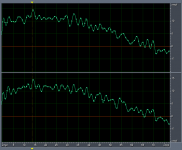
Extensive identity exists between the two, seen by subtracting the Cap1 samples in bottom track from Cap2 samples in top track:
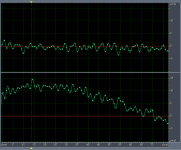
Result effectively returns dither/noise of total system.
Next Cap3 is aligned below Cap2:
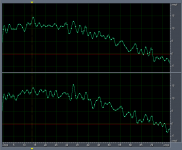
Sample 33 for Cap3 in above pic stick out with short rise time.
Cap3 samples are subtracted from Cap2 samples:
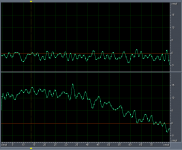
Again, basically dither/noise, but with slight negative bias, suggesting Cap3 had slightly higher overall voltage.
May Cap3 be thought of as faster than Cap2?
The above may be used to differentiate the capacitors, but similar analysis elsewhere in waveforms with higher signal levels do not produce same results, and this was not used for in my differentiation of the caps.
Lets look at first 78 samples for left channels of Cap1, Cap2, and Cap3. First Cap2 left channel in top track with Cap1's left channel in bottom track. Here I found best alignment required single sample offset:

Extensive identity exists between the two, seen by subtracting the Cap1 samples in bottom track from Cap2 samples in top track:

Result effectively returns dither/noise of total system.
Next Cap3 is aligned below Cap2:

Sample 33 for Cap3 in above pic stick out with short rise time.
Cap3 samples are subtracted from Cap2 samples:

Again, basically dither/noise, but with slight negative bias, suggesting Cap3 had slightly higher overall voltage.
May Cap3 be thought of as faster than Cap2?
The above may be used to differentiate the capacitors, but similar analysis elsewhere in waveforms with higher signal levels do not produce same results, and this was not used for in my differentiation of the caps.
Indeed. But that's not something that one should expect or count on. And there's always some schmuck who wants to sabotage things.
The schmucks usually don't like investing much time into their efforts.
Foobar ABX could readily be coded to make cache of multiple temp files, and then be continuously renaming them in the background with little computational overhead.
Schmucks would loose interest very quickly.
I am not sure if I know exactly what you mean. Do you mean cap1 - cap3 difference?
Source-Cap1, Source-Cap2, Source-Cap3.
Source is reference.
The schmucks usually don't like investing much time into their efforts.
Foobar ABX could readily be coded to make cache of multiple temp files, and then be continuously renaming them in the background with little computational overhead.
Schmucks would loose interest very quickly.
That doesn't prevent the most obvious way to cheat. Like I said, the protocols you use to test yourself are necessarily different than the protocols you need to test others without supervision. The latter is MUCH more difficult.
Unfortunately, schmucks seem to have more time on their hands to figure out ways to cheat and sabotage tests than do people who are curious about the true answer and spend the effort trying to set up the tests or to participate in them honestly.
Pavel, Cap Connection?
Isn't it funny (or sounds delusional) that a different cap can make BIG different in sound quality (I'm talking about fatigue). So is there any possibility of external effect during construction? I saw new caps picture on first page, with long leads. I like to connect cables or cut the lead to make sure that I have non-fatiguing cable (I don't like aluminum or steel lead). I used to listen to some cables before stocking them to wire my crossover replacing resistor and capacitor leads. But that even sound more funny
And there is burn-in effect. I always allow for one day (I think after 5 hours things start to fall in place) before starting to listen after changing caps.
For me nothing is more important than fatiguing aspect. No matter how good or bad an audio system is, all I want is enjoyment.
I have listened for hours now of both cap1 and cap3 (background listening at low volume). With cap1 I can feel slight fatigue in electric guitar string. But cap3 drove me crazy. May be because I heard cap1 first (and my ears became tired) so the fatiguing aspect of cap3 was "amplified".
So no doubt here, cap1 is better, even tho I believe most will prefer cap3 due to its better dynamic.
Isn't it funny (or sounds delusional) that a different cap can make BIG different in sound quality (I'm talking about fatigue). So is there any possibility of external effect during construction? I saw new caps picture on first page, with long leads. I like to connect cables or cut the lead to make sure that I have non-fatiguing cable (I don't like aluminum or steel lead). I used to listen to some cables before stocking them to wire my crossover replacing resistor and capacitor leads. But that even sound more funny
And there is burn-in effect. I always allow for one day (I think after 5 hours things start to fall in place) before starting to listen after changing caps.
Jay, at low volumes there is not difference between the files. So I doubt you can be fatigued by the sound of capacitor more than your imagination of picture of capacitor...
May be. But I have lived with this for years, almost everyday.
I like to sleep with music (I'm now sleeping on cables). I turn on music 24 hours a day. I know sounds that I cannot live with. I wish I can have imagination that all things sound enjoyable
He can definitely make the suggested changes himself. The caps were placed between two RCA connectors (each) on aluminum U shaped fixture to prevent EMI pickup. From connectors coaxial cables <20cm to D/A and A/D. I would suggest to ignore such comments, they could extend to infinity.
I'm curious what I picked up on - I got the results wrong, for me cap2 and cap3 were on level pegging, and cap1 was distinctly inferior. I didn't spend that much time on listening, swapped between the 3 several times and that pointed to cap1 being the different, lesser one each time.
I'm going to try another round of listening, to see if I get the same outcome, while armed with the knowledge of the test samples. If I do, this could point to variability of the test conditions - as in, how long the circuit was powered up and conditioned before the recording was made. Some people may see this as irrelevant, but such considerations are central to how I deal with achieving optimum sound.
I'm going to try another round of listening, to see if I get the same outcome, while armed with the knowledge of the test samples. If I do, this could point to variability of the test conditions - as in, how long the circuit was powered up and conditioned before the recording was made. Some people may see this as irrelevant, but such considerations are central to how I deal with achieving optimum sound.
- Status
- This old topic is closed. If you want to reopen this topic, contact a moderator using the "Report Post" button.
- Home
- General Interest
- Everything Else
- Mundorf polyprop x Rodenstein MKT listening test preparation
